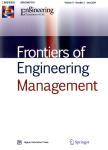How do project-oriented organizations enhance innovation?An institutional theory perspective
作者机构:Faculty of Design Architecture and BuildingUniversity of Technology SydneyUltimoNSW 2007Australia
出 版 物:《工程管理前沿:英文版》 (Frontiers of Engineering Management)
年 卷 期:2023年第10卷第3期
页 面:427-438页
核心收录:
学科分类:02[经济学] 0202[经济学-应用经济学] 1201[管理学-管理科学与工程(可授管理学、工学学位)]
主 题:project-oriented organizations innovation institutional entrepreneurship institutional theory
摘 要:A project-oriented organization is a hybrid form of organization where a functional hierarchy is augmented with structures to manage projects strategically across the organization.Six project-oriented organizations from diverse industries that emphasize innovation in their strategies were selected for this study.We use the three pillars of institutional theory—regulative,normative and cultural-cognitive—and institutional entrepreneurship to analyze interview data from executive and project,program and portfolio management personnel in the project-oriented organizations to investigate how innovation is facilitated through external influences and internal responses.Our findings indicate that processes and new structures provide effective ways for innovation and,while individuals are important,processes are more effective than individuals at enabling innovation.We put forward some lessons for practice that emerge directly from the findings,including suggestions on improving allocation of resources,a need to focus on processes,reconceptualization of“failure,and dedicated investment in market knowledge,customer knowledge,performance metrics and flexible governance structures.



